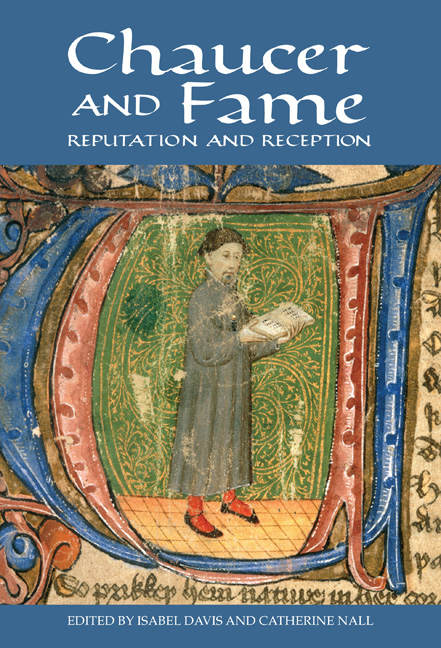Book contents
- Frontmatter
- Contents
- List of Illustrations
- List of Contributors
- Acknowledgements
- Introduction
- 1 Chaucer Joins the Schiera: The House of Fame, Italy and the Determination of Posterity
- 2 ‘I Wolde … han Hadde a Fame’: Dante, Fame and Infamy in Chaucer’s House of Fame
- 3 ‘And kis the Steppes where as thow Seest Pace’: Reconstructing the Spectral Canon in Statius and Chaucer
- 4 ‘I Nolde Sette at al that Noys a Grote’: Repudiating Infamy in Troilus and Criseyde and The House of Fame
- 5 The Early Reception of Chaucer’s The House of Fame
- 6 Fame’s Penitent: Deconstructive Chaucer Among the Lancastrians
- 7 After Deschamps: Chaucer’s French Fame
- 8 ‘Fresch Anamalit Termes’: The Contradictory Celebrity of Chaucer’s Aureation
- 9 Chaucer the Puritan
- 10 Revenant Chaucer: Early Modern Celebrity
- 11 Ancient Chaucer: Temporalities of Fame
- Bibliography
- Index
- Chaucer Studies
6 - Fame’s Penitent: Deconstructive Chaucer Among the Lancastrians
Published online by Cambridge University Press: 21 May 2021
- Frontmatter
- Contents
- List of Illustrations
- List of Contributors
- Acknowledgements
- Introduction
- 1 Chaucer Joins the Schiera: The House of Fame, Italy and the Determination of Posterity
- 2 ‘I Wolde … han Hadde a Fame’: Dante, Fame and Infamy in Chaucer’s House of Fame
- 3 ‘And kis the Steppes where as thow Seest Pace’: Reconstructing the Spectral Canon in Statius and Chaucer
- 4 ‘I Nolde Sette at al that Noys a Grote’: Repudiating Infamy in Troilus and Criseyde and The House of Fame
- 5 The Early Reception of Chaucer’s The House of Fame
- 6 Fame’s Penitent: Deconstructive Chaucer Among the Lancastrians
- 7 After Deschamps: Chaucer’s French Fame
- 8 ‘Fresch Anamalit Termes’: The Contradictory Celebrity of Chaucer’s Aureation
- 9 Chaucer the Puritan
- 10 Revenant Chaucer: Early Modern Celebrity
- 11 Ancient Chaucer: Temporalities of Fame
- Bibliography
- Index
- Chaucer Studies
Summary
Chaucer's Retraction, which sums up an impressive span of his literary works while repudiating nearly all of them, fully excepting only ‘the translacion of Boece de Consolacione, and othere books of legends of seintes, and omelies, and moralitee, and devocioun’, has provided readers of all periods with an opportunity both to imagine the penitential outlook that it conveys as Chaucer's final perspective on literature and life, and to take note of the substantial range, quantity and influence of his opus that thereby required such careful admonitions. Its ‘voicing’ is more of a problem even than usual in Chaucer. In all of its medieval copies it appears at the end of The Canterbury Tales, but since it begins by responding to ‘this litel tretys’, presumably The Parson's Tale, the Retraction does not read as though designed to close the unfinished Canterbury Tales as a whole. Possibly, as Charles Owen suggests, The Parson's Tale and Retraction were a completely separate work by Chaucer, a ‘treatise on penance’, imposed on The Canterbury Tales by other hands. All the surviving textual evidence, however, shows that the Retraction's placement and that of Fragment X as a whole was very early, and it may be argued, as Stephen Partridge does, that the rubric introducing the Retraction, ‘heere taketh the makere of this book his leve’, was early or even authorial as well, since its textual variants are best explained as cautious efforts to resolve original ambiguities rather than as the wholesale import of new materials. Even that rubric, therefore, presents a problem of voicing, or rather scripting. Partridge suggests that Chaucer himself there mimed the role of a scribe, and, by encroaching on the scribal territory of a colophon, crafted the ‘fiction of Chaucer's direct supervision and control over the transmission of his text’.
This ‘fiction’ of an author's immediate hand in this – and, implicitly, all further scribal transmissions of his text – epitomizes some of the important problems of his literary presence and absence with which, as is shown below, readers of Chaucer in Lancastrian England grappled.
- Type
- Chapter
- Information
- Chaucer and FameReputation and Reception, pp. 103 - 126Publisher: Boydell & BrewerPrint publication year: 2015
- 1
- Cited by



